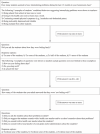Teacher mental health literacy and its effects on helping behaviors for students with mental health problems
- PMID: 40771307
- PMCID: PMC12325092
- DOI: 10.1002/pcn5.70168
Teacher mental health literacy and its effects on helping behaviors for students with mental health problems
Abstract
Aim: School teachers are expected to support students with mental health problems. However, few studies have examined actual helping behaviors of teachers for the students. This study aimed to investigate the behaviors of Japanese teachers for students experiencing internalizing problems (e.g., depression/anxiety).
Methods: In 2020, teachers (n = 465) from 48 Japanese schools (primary/junior high/senior high) answered a self-administered questionnaire asking about: (a) the number of students in their homeroom class who seemed to have internalizing problems during the last 2-3 months, (b) whether they asked these students how they had been feeling lately, and (c) the number of students who answered "not feeling well." Mental health literacy (MHL) in teachers was also assessed.
Results: Most of the teachers (80.2%) reported that they dealt with one or more students who seemed to have internalizing problems during the last 2-3 months. Among these teachers, 94.7% had asked at least some of the students how they had been feeling, and over half of the teachers (57.8%) reported that at least one of the students answered "not feeling well." Teachers who had confidence in helping students with depressive symptoms were more likely to recognize students who were "not feeling well" (p = 0.04).
Conclusion: Teachers appear to be willing to help students with mental health problems when they recognize symptoms of the problems. Future studies will benefit from more closely examining whether improving confidence in teachers through MHL training increases students' willingness to disclose mental health problems to teachers, an important step in the prevention/treatment of these problems.
Keywords: adolescent; child; helping behavior; mental health literacy; teacher.
© 2025 The Author(s). Psychiatry and Clinical Neurosciences Reports published by John Wiley & Sons Australia, Ltd on behalf of Japanese Society of Psychiatry and Neurology.
Conflict of interest statement
The authors declare no conflicts of interest.
Figures


Similar articles
-
Sexual Harassment and Prevention Training.2024 Mar 29. In: StatPearls [Internet]. Treasure Island (FL): StatPearls Publishing; 2025 Jan–. 2024 Mar 29. In: StatPearls [Internet]. Treasure Island (FL): StatPearls Publishing; 2025 Jan–. PMID: 36508513 Free Books & Documents.
-
The Black Book of Psychotropic Dosing and Monitoring.Psychopharmacol Bull. 2024 Jul 8;54(3):8-59. Psychopharmacol Bull. 2024. PMID: 38993656 Free PMC article. Review.
-
Feasibility study of Learning Together for Mental Health: fidelity, reach and acceptability of a whole-school intervention aiming to promote health and wellbeing in secondary schools.Public Health Res (Southampt). 2025 Jun 18:1-36. doi: 10.3310/RTRT0202. Online ahead of print. Public Health Res (Southampt). 2025. PMID: 40542530
-
Longitudinal Relationships Between Depressive Attributional Style and Internalizing Symptoms in an Autism-Enriched Sample of Incoming College Students.Autism Adulthood. 2025 Apr 3;7(2):185-200. doi: 10.1089/aut.2024.0090. eCollection 2025 Apr. Autism Adulthood. 2025. PMID: 40309015
-
Factors that influence participation in physical activity for people with bipolar disorder: a synthesis of qualitative evidence.Cochrane Database Syst Rev. 2024 Jun 4;6(6):CD013557. doi: 10.1002/14651858.CD013557.pub2. Cochrane Database Syst Rev. 2024. PMID: 38837220 Free PMC article. Review.
References
-
- American Psychiatric Association. Diagnostic and statistical manual of mental disorders: DSM‐5™. Arlington, VA: American Psychiatric Publishing, Inc; 2013.
LinkOut - more resources
Full Text Sources
